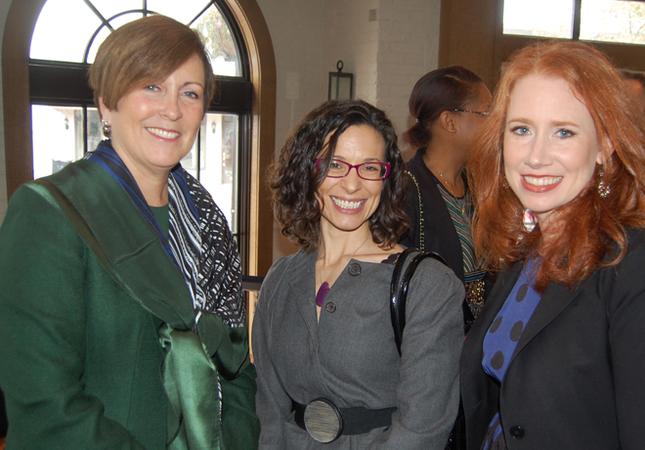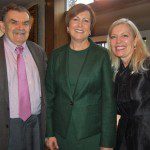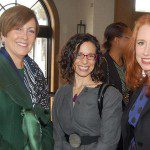Kennedy Center’s Rutter: ‘Art for Life’s Sake’
By • November 10, 2014 0 1394

She came, she talked and told stories, she laughed and, of course, she conquered.
In a nutshell, that was the story of the appearance of new Kennedy Center President Deborah Rutter at the Georgetown Media Group’s latest and last of this year’s Cultural Leadership Breakfasts at the George Town Club.
Her appearance was a part of an ongoing story—her story, as she navigates her way through the city and the center, telling and listening. In every telling, at every stop, she fills out her story and thinking and philosophy about the art and artists, about the Kennedy Center’s place in the city and the nation, and about her own life in the arts.
We have had occasion to encounter Rutter at least four times—at the public announcement of her being named to what may be the biggest cultural and performance arts job in the country, in a telephone interview on her first official day on the job, when she started the conversation by talking about what was her biggest job that day: “picking out my daughters clothes for her first day in school.”
Several weeks ago, we saw Rutter in her first talk at the National Press Club. Even as she deftly handled being grilled on such matters as the stature of the National Symphony and the Washington National Opera and the state of the Millennium Stage and the contratemps surrounding Kennedy Center Honors selection, she began to formulate certain themes—collaboration with other arts institution, art as life, story telling, bringing the arts to the neighborhoods, the ideas of arts and performance arts especially, as a shared and unique experience.
In the process, certain characteristics emerge—she has what seems a sense of humor based in enthusiasm—at the George Town Club, an intimate setting that speaks to history, she delighted in being introduced as growing up in Encino, Califo., “which makes her a Valley girl.” She laughed and agreed. “I am a Valley girl,” she said. “And I’m proud of it.” Which reminded me of the telephone conversation, we had when she said, “Don’t let anybody kid you. We’re all rock and roll babies.”
Over time, that accessibility leads you to a very democratic notion about the arts — not only that art is for everyone but that all sorts of things can be art. “I believe there is such a thing as art for art’s sake, but it shouldn’t be a limiting idea, the notion that art is only for a certain amount of people. It’s the one thing in life that makes everyone’s life better. To me, it becomes art for life’s sake. There is something there in art that unites us—watching the WNO’s ‘La Boheme’ the other night was a beautiful experience. It’s a beautiful work, and it brought in young people and older people. In this way, it’s all a shared experience.”
“We are all in this business in one way or another,” she said. “It’s about story telling. Some of you I know do that, tell stories, factual stories, about the arts. We’re all story-tellers, all the arts tell stories—film, music can tell a story, paintings tell stories, the opera—love, betrayal, anger, murder, greed—stories, powerful stories.”
Rutter told stories—some short vignettes, about moving here. “I like to settle in to have my neighborhood grocery store, the school, the park, for the length of time that I’m here,” she said. “I was in Chicago a long time, certainly, and it’s hard to say goodbye to friends and places, but it’s also exciting to be in a new place with new challenges.” When she was told there was a Giant in her neighborhood about to open, she was delighted. Art in life, everywhere.
She told the story, and it took a while, it was one she had told before, how when she hired and she was right, I’d heard it before but in the telling—how when she was head of the Chicago Symphony Orchestra Association, she had hired famed Italian conductor Riccardo Muti as music director. “We all had thought of ways to reach out to the larger, under-deserved community in Chicago, trying ways to do that.
“Muti suggested we go to prisons,” she recalled. “Our jaws dropped. What in the world kind of moment.”
In the end, she said, “That’s what we did, we went to a juvenile detention center for teenaged girls. One of our chorus people set up a program to teach some of the girls composition, writing melodies or songs, about their own lives, making a kind of art out of their lives, art as life. And Muti came, and they performed their efforts, and he hauled in this Steinway into the prison, and oh, my God, it was a powerful experience, for them, communicating their lives to us because it was not easy for them.”
“This is also what it’s about, art is the way we communicate our lives to others, through stories, through music,” she said.
Rutter is known for collaboration, for promoting the works of living composers and was intrigued by last year’s hip-hop festival. She is interested in the challenge and opportunities presented by the Kennedy Center’s proposed new renovation and expansion.
She was asked about the rise of women leaders in the arts. “Well, I have to tell you, I received a lot from my father, who made me believe I can do anything,” she said. “He was my first feminist. But I think it is a good sign all across the country. This is especially noted in this city, where women are becoming such a presence in government.”
A voice on the phone, a woman behind a lectern being introduced, effortlessly holding the Press Club audience or moving, without lectern, mike or notes, in the small confines of the George Town Club, at home and at ease in her skin in each setting. Rutter — who plays piano and violin — brings her own kind of music to each occasion.
- Jordan Wright
- Jordan Wright
- The Kennedy Center’s Deborah Rutter with Michelle Pendoley of Wolf Trap and Eileen Andrews of the Baltimore Symphony Orchestra. | Robert Devaney




